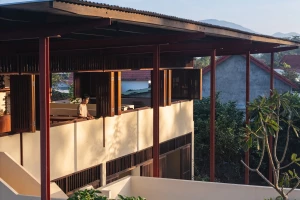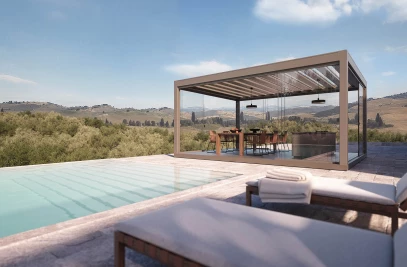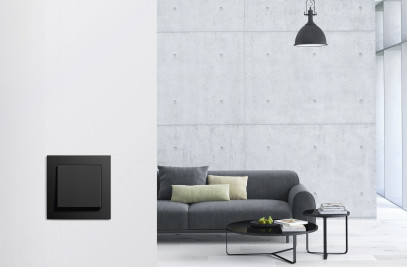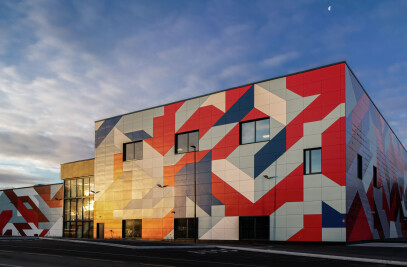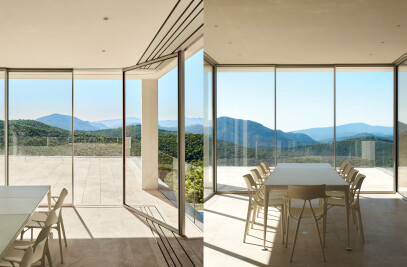The Jury, consisting of chairwoman Tatiana Bilbao (founder Tatiana Bilbao Estudio), Francesca Ferguson (Founder of the MakeCity Festival for Architecture and Urban Alternatives) , Mia Hägg (founder of Habiter Autrement), Triin Ojari (director of the Museum of Estonian Architecture), Georg Pendl (CEO of pendlarchitects), Spiros Pengas (former deputy Mayor of Thessaloniki) and Marcel Smets (professor of urbanism at the Katholieke Universiteit Leuven), selected five projects that in their views are exemplary design strategies for how to manage community and circular sustainability processes, approach a productive and self sufficient city, and are the result of well-developed construction processes and craftsmanship in the use of materials and details.
Here are the five finalists with the Jury’s words:

85 Social Housing Units by peris+toral.arquitectes, Cornellà de Llobregat, Spain, 2020
“The bases of this new residential building are a matrix of communicating rooms that eliminates corridors to guarantee optimum use of the floor plan and the use of timber to enable the industrialisation of elements, improved quality of construction and a major reduction of deadlines and C02 emissions.”

Frizz23 by Deadline, Berlin, Germany, 2018
“The architects adapted the Baugruppe model to create workspaces for arts, education and the creative industries and assumed the roles of developers to build the community of users for the project. 32 small companies and nonprofits threatened by Berlin’s rapid gentrification joined to secure their workspaces. The architects first assembled the group around their programmatic goals, and then designed the building in continuous dialogue with the users, the neighborhood, and the city.”

The Railway Farm by Grand Huit and Melanie Drevet Paysagiste, Paris, France, 2019
“Born from the desire of residents and local associations to see a place that combines urban agriculture and solidarity grow, the Ferme du Rail aims to integrate vulnerable people. The farm offers emergency social housing and social reintegration of 15 social reintegration housing units, 5 social student housing units, an unheated productive greenhouse, a restaurant open to the public, a mushroom-growing cave and a permaculture garden. Its objective is to minimize the need for energy, food and financial resources by implementing a circular economy.”

Town House - Kingston University by Grafton Architects, London, UK, 2020
“Inspired by the progressive educational vision presented in the brief, and the wish to connect with the community, we responded by arranging the programme in a three dimensional matrix, one singular complex space which links the various elements of the brief, giving at the same time to each part its identity, a place where spaces and uses interlock, and connect physically or visually, creating an environment that encourages overlap and exchange.”

Z33 House for Contemporary Art, Design and Architecture by Francesca Torzo, Hasselt, Belgium, 2019
“Z33 settles in continuity with the existing buildings around the béguinage, echoing the dual character of their facades, enclosed towards the street and open with windows’ filigrees towards the garden. The exhibition rooms and the secret gardens compose a spatial labyrinth, amalgaming memories of local passages with ones of foreign villas or Palaces.”
For the Emerging Architecture Award the Jury selected these two finalists:

Enrico Fermi School by BDR bureau, Turin, Italy, 2019
“The project transforms a school of the 1960s in a semi-peripheral district of Turin, rethinking the architecture through the engagement of school communities in the definition of pedagogical guidelines, with the ambition to renovate both learning spaces and teaching methods. The existing building had a poor relation with outer spaces and a series of underused interior spaces. Part of the strategy to reverse this condition lies in the reorganization of accesses and external areas, opening the school to the city.”

La Borda - Cooperative Housing by Lacol, Barcelona, Spain, 2018
“La Borda cooperative housing is a self-organized development to access decent, non speculative housing. The cooperative prioritized making a building with minimal environmental impact, both in its construction and its lifetime. Another basic objective is to eliminate the possibility of energy poverty among its users, which some of them suffered due to the high cost of energy. The initial strategy of the project to reduce energy demand has been the optimisation of the program, renouncing the underground car parking, grouping services and reducing the surface of the houses.”
In March the Jury will visit the five works to determine the winners that will be announced at the end of April. The Award ceremony will be held on the 12th of May in the Barcelona Pavilion.



















